Although most of our posts are about Marketing, we really are an Aviation Business Management company – and a lot of the consulting we do centers around questions about how to run your business better.
In fact, it’s sometimes hard to determine where marketing stops and business management takes over. But that’s why we have John!
So, negotiation has a role in marketing and sales, but it also has a role in just about every business relationship with a vendor or an employee or a supplier. So, today we’re talking about how to be successful with negotiation in the aviation industry, using a unique parallel – sports!
[embedyt] https://www.youtube.com/watch?v=Y3u8xL7zATo[/embedyt]
[smart_track_player url=”http://traffic.libsyn.com/aviationmarketing/Aviation_Business_Management_-_Three_Negotiation_Tips_from_a_Sports_Agent.mp3″ background=”default” ]
Transcript Aviation Business Management – Three Tips for Negotiation Success
Paula Williams: Welcome to this week’s episode. Today we are talking about an aviation business management topic that is kind of tangential to sales and marketing, but very important, right?
John Williams: Yes.
Paula Williams: So negotiation. Why nice, but smart guys … guys in the gender neutral sense of the word … finish first, right?
John Williams: Right.
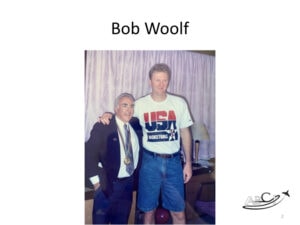 Paula Williams:: Okay. So we live in Salt Lake City where basketball has pretty much permeated the culture here. Just about every auto dealership and/or restaurant has something to do with basketball. We had Karl Malone here, we had John Stockton here. We eat at the Tuscany, which is a really nice restaurant that’s owned by Mark Eaton. They have a seven foot four inch chocolate cake that is really fantastic. It’s actually seven inches by four inches, but you still need to bring four friends to eat this piece of chocolate cake.
Paula Williams:: Okay. So we live in Salt Lake City where basketball has pretty much permeated the culture here. Just about every auto dealership and/or restaurant has something to do with basketball. We had Karl Malone here, we had John Stockton here. We eat at the Tuscany, which is a really nice restaurant that’s owned by Mark Eaton. They have a seven foot four inch chocolate cake that is really fantastic. It’s actually seven inches by four inches, but you still need to bring four friends to eat this piece of chocolate cake.
John Williams: Disgustingly large, but disgustingly good.
Paula Williams: Oh my gosh, it’s fantastic. So yeah, anyway, basketball is a big deal in Salt Lake City. Before all of that happened, when I was growing up in Salt Lake City, Larry Bird was the big guy, literally. You’d see him around town. Really nice guy, one of the coolest people you’d ever meet. But his agent, who is not quite some famous nor quite so tall, is Bob Woolf. Bob Woolf is no longer with us, but he wrote two books on negotiation that I think are really relevant for us today. You’re asking probably, “Why aren’t we talking about Herb Kelleher or Richard Branson or some other famous negotiator in the aviation industry?” Well, we do talk about them sometimes, but today there’s actually a lot of parallels between aviation and sports. One of the is that they’re both elite meritocracies.
What Does Aviation Have to do with Sports?
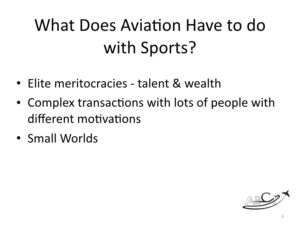 John Williams: Among other things, yes.
John Williams: Among other things, yes.
Paula Williams: Yeah, I mean, how many … what percentage of the world’s population is involved in aviation?
John Williams: Not much.
Paula WIlliams: Probably not.
John Williams: A couple maybe. Maybe.
Paula WIlliams: Yeah. So I think I read somewhere that like 2% of the world’s population are pilots, an even smaller percentage than that are A&P technicians of different specialties and things like that. So it’s a very small field where very talented people are very sought after, right?
John Williams: True.
Paula WIlliams: It also includes a lot of wealth. There’s a lot of money in the aviation industry. That’s no secret. And a lot of money in sports, too. Both aviation and sports have very complex transactions with lots of people who feel like they have a say in everything that happens in different ways. If you don’t believe that, read the news about Santa Monica, right?
John Williams: Exactly.
Paula WIlliams: Or any other airport or any other large corporation that has a flight department, there’s a lot going on, right?
John Williams: Absolutely.
Paula WIlliams: And different people with different motivations who are not always in favor of what you’re trying to do, whatever that is.
John Williams: Yes, and that’s not even talking about the regulatory people.
Paula WIlliams: Oh yeah, that’s true. All right. They’re also very small worlds. So on one end of the spectrum you’ve got like New York real estate where if a deal goes south or if you don’t get along with them then you can just keep going, somebody else will be along in five minutes to rent your apartment or whatever. But on the other end of the spectrum, we’ve got aviation and sports where there are only so many people. You have a very small market for your product or service and everybody knows everybody, right?
John Williams: Yes, absolutely.
Paula WIlliams: Okay, so with those three things in mind, a lot of the things that Bob Woolf talks about are really relevant to us. One thing he says is there’s a misconception that people who are dishonest and cutting are going to win. They’re not, they’re going to lose. That’s what I believe, and that’s because of these three things. Very different from some other parts of the world. So here’s rule number one. He has a lot of different rules from different parts of … He actually wrote …
John Williams: Sorry.
Paula WIlliams: That’s okay. So I picked three Bob Woolf rules from amongst his two books. I like the number three. It’s a good number for a podcast, and it’s also an easy number to remember. There were three that really stuck out in the process of reading these two books, the first one being always leave money on the table. Now this is the opposite of what just about anybody who’s taken any kind of an MBA course has learned, right?
Always Leave Money On The Table
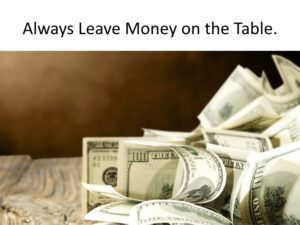 John Williams: Well, true, but you leave money on the table in such a matter that they know you have … you could ask more. That doesn’t mean, however, that you undersell your product capability, but you don’t always take top dollar.
John Williams: Well, true, but you leave money on the table in such a matter that they know you have … you could ask more. That doesn’t mean, however, that you undersell your product capability, but you don’t always take top dollar.
Paula WIlliams: Right. So Bob says, “I haven’t done a single contract that I couldn’t have gotten more money on. I always leave money on the table.” This is an interview with Ink Magazine. Ink says, “Forgive us, but a lot of people will read that and think you’re nuts. Let’s assume that you can sell a computer system for $220,000. You’re saying you’re going to take $200,000 for it. Why not pick up that extra 10%?”
Woolf says, “Because it’s possible to push the price too far a to create antagonism, and that extra 10% just isn’t worth it. If someone feels that you held them up, they’re going to take it out on your business, or if it’s an employee, they’re going to take it out on you. In my case, they’re going to take it out on my client, make him miserable, trade him, get him injured, something like that. Obviously negotiation isn’t only about money. You always want to leave some money on the table and moderate your ambition, or reputation for greed is going to cost you in the long run.”
There was another podcast I was listening to about a week ago where they talked about, “the mental airbag.” Have you heard this concept?
John Williams: No.
Paula WIlliams: It’s actually really funny, but really true. You make someone’s mental airbag go off in a negotiation and suddenly they become defensive. So they sense danger, they sense, “This guy’s really out to get me,” and boom, all of a sudden they’re backpedaling and the negotiation is all but over, at least as far as a favorable outcome as far as you’re concerned, right?
John Williams: True.
Paula WIlliams: Yeah. So always leave money on the table is not as crazy as it sounds. Right? Okay. Second rule, know your numbers.
John Williams: Absolutely know your numbers.
Paula WIlliams: Right. This is the hardest part for me, because numbers are not second nature to me like they are for some people. But before we go into a negotiation, if we have time, John and I will usually sit down and talk about all of the possibilities and what effect that’s going to have with us. Luckily with my company, with the marketing company, everything is from a catalog, so we don’t really negotiate prices or prices. In your company, however, where you do business consulting it’s hard to price, right?
John Williams: There’s no way. It’s always different.
Paula WIlliams: Yeah, so it’s always a negotiation and you have to know your numbers in order to …
John Williams: Of course.
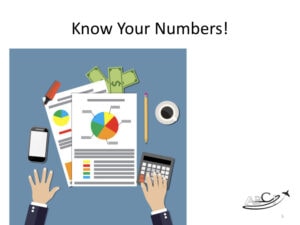 Paula WIlliams: … do well in that. So Bob Woolf would take in a table, he tried to make a one page document with all of the relevant data, here’s what all of the similar players, the similar teams are making, here’s all of the circumstances of that and all of the other commissions and things that are happening. In response to that. He’d throw that on the table at the beginning of the negotiation and say, “Yeah, here’s the market, here’s the data. Do we agree that this is what we’re looking at in terms of the atmosphere in which we’re playing?” and that way everybody in the room knows that he has done his homework and they’re not going to take him for a ride.
Paula WIlliams: … do well in that. So Bob Woolf would take in a table, he tried to make a one page document with all of the relevant data, here’s what all of the similar players, the similar teams are making, here’s all of the circumstances of that and all of the other commissions and things that are happening. In response to that. He’d throw that on the table at the beginning of the negotiation and say, “Yeah, here’s the market, here’s the data. Do we agree that this is what we’re looking at in terms of the atmosphere in which we’re playing?” and that way everybody in the room knows that he has done his homework and they’re not going to take him for a ride.
John Williams: Right.
Paula WIlliams: And being totally transparent with that, which is really, really cool. One thing you don’t want to be totally transparent on is what number you’ve agreed with your client or what number you’re willing to take. That’s a confidential number that you have in your head. He says you always want to take your best target, which is a confidential number, and then back that off by 5%.
John Williams: If you approach it right, sometimes the person you’re negotiating with will go over your number anyway.
Paula WIlliams: Right, exactly. In which case you may want to bring them down a little bit because of rule number one, right?
John Williams: Exactly.
Paula WIlliams: Okay, and say, “I could take that, but given the competitive data and everything else, I think we need to go for this number. I think that would be more fair.” That will get around like nobody’s business if you’re willing to do that. Okay.
Rule number three is always have a, “Toronto.” Of course there is a story here.
John Williams: You need a picture on the screen?
Paula WIlliams: I need a picture on the screen. So this is a postcard from Houston if you’re not seeing the screen, if you’re just listening to the podcast. So this is 1973, so going way back to the dawn of time, Bob Woolf represented John Matuszak, who was the first draft choice for the Houston Oilers. That’s way back, right?
John Williams: Mm-hmm (affirmative).
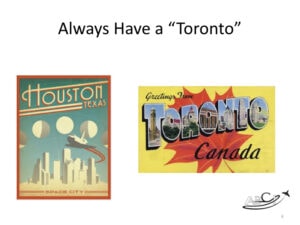 Paula WIlliams: Houston’s offer was unrealistically low, Woolf believed, and he told Matuszak to sit tight. Houston refused to budge, too, until Woolf and Matuszak flew to Toronto to discuss the possibility of signing up for Canadian football. Just by good luck, Woolf insists, the two men were photographed by a wire service. When Woolf returned to his Boston office, Houston general manager Sid Gilman was on the phone. “Bobby, Bobby,” he pleaded, “what’s this about you and Matuszak being in Toronto? Let’s get his contract settled.” Two days later, Houston agreed to pay Matuszak 50% more than the original offer.
Paula WIlliams: Houston’s offer was unrealistically low, Woolf believed, and he told Matuszak to sit tight. Houston refused to budge, too, until Woolf and Matuszak flew to Toronto to discuss the possibility of signing up for Canadian football. Just by good luck, Woolf insists, the two men were photographed by a wire service. When Woolf returned to his Boston office, Houston general manager Sid Gilman was on the phone. “Bobby, Bobby,” he pleaded, “what’s this about you and Matuszak being in Toronto? Let’s get his contract settled.” Two days later, Houston agreed to pay Matuszak 50% more than the original offer.
So if you’ve got somebody that is unwilling to budge and is being unrealistic in your offer, it really helps to have a full pipeline of other opportunities, and to subtly or not so subtly. Aviation is a small world, so people will know that you’re talking to their competitors. There is nothing wrong with that, that’s professional detachment, right?
John Williams: Exactly.
Paula WIlliams: Yeah. So you never want to be disloyal to an existing customer and you never want to divulge any confidential information between clients, because that is the kiss of death. But everybody knows that if you’re in business, you are after clients, and if you’re going after clients who happen to be competitors of each other, fair game, right?
John Williams: Of course.
 Paula WIlliams: Right, okay. So I have one other story about not backing down. This is our backyard. In fact, when we first moved in, there wasn’t even that wire fence back there. There’s 11 acres behind our property that is pretty much just field, and then behind that there is a canyon, so it goes back into the mountains. There’s a lot of wildlife back there. There used to be more, unfortunately, but suburban creep and all that causes some of that to go away.
Paula WIlliams: Right, okay. So I have one other story about not backing down. This is our backyard. In fact, when we first moved in, there wasn’t even that wire fence back there. There’s 11 acres behind our property that is pretty much just field, and then behind that there is a canyon, so it goes back into the mountains. There’s a lot of wildlife back there. There used to be more, unfortunately, but suburban creep and all that causes some of that to go away.
But when we first moved in, and even now, there’s deer, and antelope, and skunks, and badgers. Let me tell you about badgers. This is a meme that I saw on Facebook and it comes up every once in a while. I know it’s … I can’t find the source of it, it’s just one of those things that’s floating around the internet.
So the European badger looks like a nice guy. He would invite you into his cozy and clean borough to have some tea. American badger has got a shank and is waiting for you in a dark alley so he can rob you and spend your money on methamphetamines. So those of us who are our European friends, you probably recognize … when I say, “badger,” you’re not thinking about the same thing that I’m thinking of when I say, “badger,” right? So the badgers in our field are like the one on the right. Okay.
We had, when we first moved out here, a Doberman mix. He has since gone over the rainbow bridge and is waiting for us in heaven. But while he was here, he took very seriously his duties of protecting the house and the family and everything else from all of the cast of characters that were in the 11 acres behind us and even behind that in the mountains.
 So this badger decided to wander by the house. Our dog and this badger were facing each other off and neither one of them was going to back down. I think the dog knew he’d lose his membership in the dog union if he let this badger come any closer to the house. This badger of course was an existential crisis where he probably has other creatures encroaching on him from other sides and he’s not going to back down.
So this badger decided to wander by the house. Our dog and this badger were facing each other off and neither one of them was going to back down. I think the dog knew he’d lose his membership in the dog union if he let this badger come any closer to the house. This badger of course was an existential crisis where he probably has other creatures encroaching on him from other sides and he’s not going to back down.
I’m thinking, “Do I get the garden hose? Do I yell?” but I didn’t want to break their concentration, because they were just in a rumbling, graveling, snarling, deadlocked staring contest. So this went on for what seemed like an eternity. Eventually, however, they negotiated the terms of the boundaries that they were going to agree on. Ever since then we didn’t have any trouble with the badger and the badger didn’t have any trouble with us.
So this is what I think of when I think about not backing down. I mean, even no matter what’s at stake, you don’t necessarily need to be nasty about it, but you do need to have a line that you’re not going to cross. Even if that means walking away from the deal, cool. We walk away from deals all the time.
John Williams: Yes, we do.
Paula WIlliams: And our clients walk away from deals all the time and almost always end up better for it for one reason or another. Either a better deal comes along or the other party comes back to the table at a later time. You’d be surprised how often that happens, especially since it’s a small world, right?
John Williams: Exactly. It is surprising how often that happens actually.
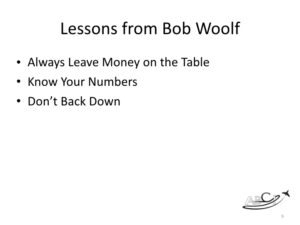 Paula WIlliams: Right, exactly. So you don’t have to be the badger, you can be the Doberman. It’ll be fine. Okay, so lessons from Bob Woolf, just to recap. One, always leave money on the table as opposed to the corollary which we all learned in business school, “Never leave money on the table,” right?
Paula WIlliams: Right, exactly. So you don’t have to be the badger, you can be the Doberman. It’ll be fine. Okay, so lessons from Bob Woolf, just to recap. One, always leave money on the table as opposed to the corollary which we all learned in business school, “Never leave money on the table,” right?
John Williams: Mm-hmm (affirmative).
Paula WIlliams: Know your numbers, which we all learned in business school. That actually jives. The third thing is don’t back down, even if it means no deal. No deal is a perfectly fine response.
John Williams: Yes, it certainly is.
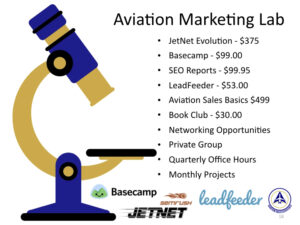 Paula WIlliams: Okay. So this episode was brought to you by our aviation marketing Lab where we provide the tools and the consulting to help our customers get through some of these tough negotiations, right?
Paula WIlliams: Okay. So this episode was brought to you by our aviation marketing Lab where we provide the tools and the consulting to help our customers get through some of these tough negotiations, right?
John Williams: Mm-hmm (affirmative).
Paula WIlliams: A lot of office hours that we spend with our lab clients is about, “How do I negotiate this deal?” or, “How do I get the numbers to figure out what price to propose for this situation?” All of these tools and all of the consulting that come with that is really designed to help small companies act like large ones, and to have the same advantages, and to really level the playing field.
John Williams: And to grow into larger ones.
Paula WIlliams: Exactly, exactly. So we’d love to have you doing this in our Marketing Lab. It includes some of the smartest people in the aviation industry. You should be one of us if you are one of those, right?
John Williams: If you want to talk to us, we’re going to be at NBAA.
Paula WIlliams: Yes, absolutely. That’s October this year, so late October. If you’re going to be there, please do set an appointment with us and we’d love to talk with you.
John Williams: Absolutely.
Paula WIlliams: Thank you for joining us and have a great afternoon.
John Williams: See you next time.
Podcast: Play in new window | Download
Subscribe: Spotify | Amazon Music | RSS